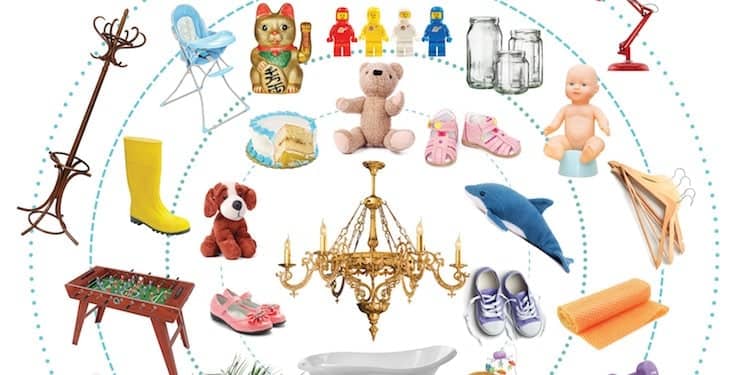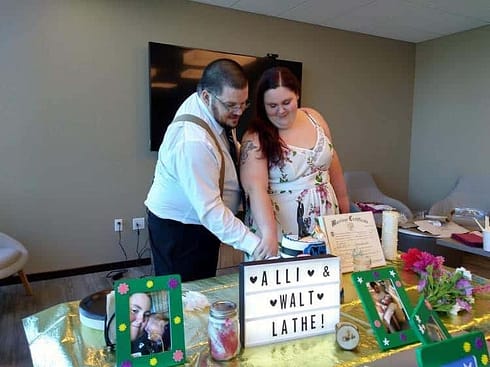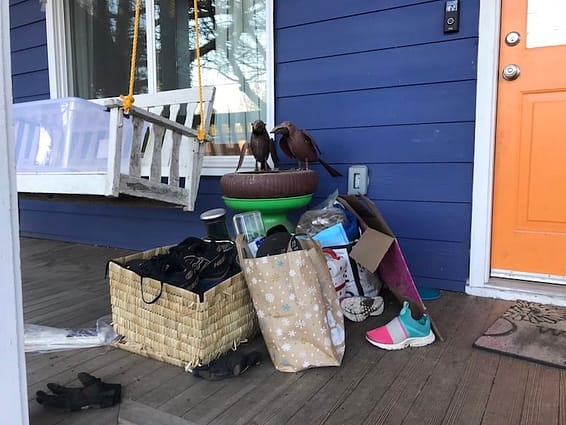
From Costco cake to high chairs, Portland parents use local Buy Nothing groups to give away stuff they no longer need and find new-to-them items to cherish. Get the scoop on what you need to know before diving into the world of gifting and searching.
In a world where search engines and email accounts collect our data to sell us shiny new things, the Buy Nothing Project is an online social movement designed to share the things we already have with the community immediately around us. The project was started in the Pacific Northwest in 2013 by two friends, Rebecca Rockefeller and Liesl Clark, as an experimental hyper-local gift economy, which has since expanded worldwide. The tagline of the project is “Buy Nothing. Give Freely. Share Creatively.” Offers to give and requests for items take place in private Facebook groups, but the exchanges happen in real life, with group members in your demographic area. There are nearly 100 local groups in the greater Portland metro area, encompassing neighborhoods or even just parts of neighborhoods such as Kenton/N Portland, Eastmoreland/Woodstock (South), Bethany/ Beaverton (North) or Milwaukie (South)/Oak Grove (North), among many, many more.

Each group adjusted to COVID-19 in its own way: some halting all transactions, some limiting to gifting of essential items only, some working to deepen human connection during social isolation. While contactless pickups and drop-offs are the current norm, many participants report continuing to feel connected to neighbors via their Buy Nothing communities simply for the knowledge that others continue to be there for assistance — whether with a needed item such as a queen bed frame, or with virtual support, such as a supportive comment online. Longtime Buy Nothing administrator, mentor, moderator and coach Dev Ansel posted this to her group: “Buy Nothing is about the people first and foremost! The stuff we give/get is just the vehicle we use to get there. Even in this pandemic, I see each of you caring about your neighbors.”
Generosity of Strangers
Prior to COVID-19, Portland resident and Doernbecher Children’s Hospital volunteer Kristen Earl put out the ask to turn the in-hospital nuptials of a couple with an premature infant in the neonatal intensive care unit (NICU) into a touching celebration. “Once I got the go-ahead from the bride and groom, I posted on Buy Nothing that I was organizing a wedding in the NICU in three weeks on zero budget,” says Earl.
Her post in her Southwest Portland Buy Nothing group immediately received offers for decorations such as Mason jars, picture frames, Champagne flutes, artificial flowers, and even Airbnb honeymoon accommodations. Although Earl was not surprised with the positive response, she was impressed with how many people offered to help and their willingness to come to her. The bride and groom, too, were overwhelmed with gratitude. “They were incredibly speechless,” Earl says. “These are strangers to them — strangers to me, even — and just that people would be so excited about them legally binding their love to each other.”

Some participants, like Earl, have nothing but love for Buy Nothing. She relishes meeting and developing connections with her neighbors, appreciates the increased ease with letting go of her own belongings, and is grateful for the items she has generously received, particularly as the mother of a child with complex medical needs. Earl fondly remembers an instance when her daughter had recently had surgery and Earl had not yet prepared anything for her birthday. She “put out the ask” on her Buy Nothing Facebook page, and fellow members immediately provided her with gifts and decor. It wasn’t that she couldn’t afford it financially, she says, but emotionally she was spent. She has also received meals during her daughter’s surgeries, and has connected with other parents of kids with complex medical issues. “It’s the community — it’s having a group of strangers as a safety net, it makes me feel not alone.”
While the groups comprise people of all ages and proclivities, parents make up a distinctive demographic of the members. Ansel has witnessed myriad collaborations between parents in various Buy Nothing groups across the Portland area. She has observed many exchanges of material goods, including clothes, toys, games and even breast milk, and also offers of time, such as volunteering for school events. “It warms my heart to see parents getting the connection to other parents, for whatever helps sustain them for whatever period their kid is going through.”
Some groups have a different vibe
Nicole (who requested to be identified by first name only) has been a grateful recipient of many wonderful items as a new mom -— particularly those bigger-ticket items that are useful for babies and young kids only for a short period of time, such as swings, bassinets, bouncers and walkers. Additionally, she was able to transition this online network into actual real-life friendships. Thanks to these rewarding experiences in her Buy Nothing group in California’s Marin County, she joined a group in Northeast Portland when she relocated to be closer to family. Unfortunately, her local experience has been much less positive.
Overall, Nicole says the Portland group has felt less equitable — that the offers haven’t matched the asks. “It’s like I have to dig through piles of trash, so to speak, to get to things that are useful to me … I’m still a part of [the group], but I hid it on Facebook after people were giving away leftover Indian food and almost-expired yogurt.” In scrolling through her Buy Nothing Facebook feed, she sees offers for a small coin purse, a half-empty jar of body butter, a single broken kitchen chair, cinder blocks and very used baby bibs. Meanwhile, she notes one member asking for a portable DVD player, Cricut craft machine, storage tubs, working fridge, fairy garden, iPhone and car seat. As much as she values community and good stewardship, she says her current Buy Nothing group doesn’t seem to reflect a true gifting economy. “It’s not entirely in the spirit of giving and sharing; it’s a lot of taking. It feels less like borrowing a cup of sugar from a neighbor, and more like, ‘I’m baking a cake, who has all the ingredients for me?’” (Which, she said, one member actually posted). “I haven’t felt entirely like I belong in this group, because maybe I am not good enough at preventing waste that I’m comfortable eating someone else’s leftover Indian food.”
Michelle (who requested to be identified by first name only) also has mixed feelings regarding her Buy Nothing experiences. On the whole, she is an active participant and enjoys giving freely. But she says the group dynamic can be soured by a few greedy members. Michelle knows one neighbor both on and offline who she says often exaggerates and manipulates personal experiences to garner some of the more competitive big-ticket items, such as KitchenAid mixers. For Michelle, this type of behavior harms those who might need support the most. “I really dislike scammers. We all need to contribute a little in this world. When someone does nothing but take, they aren’t being a good citizen … it really bothers me as I know of so many that are in real need.”
That said, Buy Nothing explicitly states that the gifting economy is about “giving, receiving and sharing with each other from our own abundance of stuff, skills and generosity,” so technically “need” is not a factor. Understanding these principles can be a steep learning curve for many, Ansel says. “I came from a garage-sale mentality, which has to do very much with what I grew up learning in the market economy.” Ansel often finds herself looking around her house, wondering about the last time she used a particular item. “I retrained my brain, so I’m going to give it to someone who actually wants one. To me, that’s a huge mindset change. And hey, guess what, I get to meet a new neighbor in the process!”
The joy of decluttering
Other Buy Nothing members appreciate and find meaning in their experiences with the group, too, but less for the sense of community and more for ridding their homes of otherwise useful items; the direct, neighborly giving is a great — though potentially time-consuming — alternative to Goodwill hauls or even the dump. Michelle Stevens, a member of a Southwest Portland group, uses the group primarily for purging belongings that she and her family no longer need, such as household items or kids’ toys. She is also an active member of a neighborhood buy/sell/trade moms’ group, which she said she prefers for child-related items simply for more reliable communication and follow-through with group members, such as when picking up free items. “I do prioritize people I know or who have picked up before, because the goal for me is to get rid of it. If I decide I want it gone, I want it gone today.”

Because Buy Nothing is essentially a social movement, it requires the time and effort of many volunteers, such as moderator Ansel. She views her time spent supporting groups both locally and nationally as an opportunity and mission to connect people. Her most memorable recent experience in a local Buy Nothing group on the east side followed a “Big Ask/Little Ask” post inviting members to respond with their own current wants or needs. “The ask can be as big as a house or car, or as little as a Q-tip®. We actually gave away a car that day,” she says. “All it needed was a battery, which someone else offered. And the person asking got off the streets to live in their car in a church parking lot. Someone else gave a yard and a tent to the person to stay in. Eventually they got connected to social services and a part-time job and a place to stay. There was a person-to-person connection to work together offline to make it all happen.”
Some members have very strong feelings about the good, the bad or the ugly of the social experiment, while most fall somewhere in the more neutral territory. Most agree that not picking up free items as agreed upon is the universal pet peeve. Buy Nothing groups seem to mirror our communities — our humanity, even. While there are, of course, limitations, loopholes and liars lurking among us both online and off, for the most part the Buy Nothing Project does indeed bring us together to support one another, making connections both big and small. Sometimes these online offers or requests change — and even save — lives, whether it’s a NICU wedding organized by strangers or a “Big Ask” for a car that ultimately leads a local group member to work and stable housing. As Ansel says, the things themselves are not the crux of the groups, but are the “vehicles for which we make neighborly connections.”
Buy Nothing: Getting Started
Standard Posts
• Offering goods or services to give, lend or share
• Requests for goods or services to borrow or keep
• Expressions of gratitude
Rules
• Adults only
• Participate as yourself
• Give where you live
• Participate in only one group
• Keep it legal
• Follow the code of conduct and respect your neighbors
• Give freely, with no strings attached, without limits to gifting or receiving
• No trading, bartering, buying or selling
• No requests or offers for monetary assistance
• No offers of advice or referrals to outside resources
Lingo
• “Let it simmer” — allowing time to pass after posting an offer before selecting a recipient
• “Sprouting” — when a group gets too big and breaks into smaller, more local neighborhood groups
• The Project prefers full sentences, but you frequently see “PPU” for porch pickup, “ISO” for in search of, or “INO” for in need of
